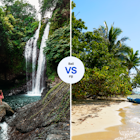

Find the best waves in Indonesia with this guide to top surf spots © Cavan Images / Getty Images
You can't just say you've surfed Indonesia – it's like saying you've hiked the Himalayas.
Clocking up to 99,082km (61,567 miles) of coastline across an archipelago of 17,508 islands, much of this land is kissed by the consistent swell channels of the Indian Ocean and much of it is fringed by volcanic reefs that help raise barrels, tubes and perfect wedge waves. This is the War and Peace of surfing destinations.
There are some spots that tower above the crowd. Trailblazers discovered the marching left-handers of Bali's Bukit Peninsula in the '70s and the rest is history. Java's G-Land has seen veteran sessions by American pro surfer Kelly Slater and others. But there are also untrodden frontiers of surf yet to be found – under the smoke-belching volcanos of Sumbawa, perhaps, or by the glistening conch beaches of Sumba.
Here's your guide to finding the best waves in Indonesia.
The best time to surf in Indonesia
There's always swell in Indonesia, but it's the dry season that magnetizes the surf-mag photographers and the pros. From May to September, the waves originate in the deep southern parts of the Indian Ocean and hit the mainstays of Bali and Java at a neat southwest angle.
That's on target for the cliffs and reefs of the iconic Bukit Peninsula and pretty much the whole archipelago nation beyond, especially when combined with the easterly trade winds offshore. Wet season (October to March) is okay for beginners and intermediates who want a bit of size and sting taken out of the mix.

Uluwatu is Bali's ultimate surf spot
The name Uluwatu is an Indonesian portmanteau of one word meaning "the end of the land" and another meaning "rock." One glance off the sheer-cut cliffs on the western side of the Bukit Peninsula in southern Bali and you can see how they came to that – the stone lurches 70m (230ft) straight out of the raging Indian Ocean.
Those heavy shoulders of limestone combine with a shallow shelf of reef to give prime geology for making waves, especially between March and September, when the dry-season south-southwesterly swells pump up.
The result? Set after set of 15m-plus (5ft) bombs that crash left and run along the Balinese cliffs. As they go, they offer up five individual surf breaks. The best is certainly Outside Corner, a fat wave with punchy faces that invites turn after turn. Further down is Racetracks, where the H2O speeds into spinning barrels. Most mere mortals will content themselves with spectating from the clifftop bars.
Getting to Uluwatu: Take a 45-minute taxi from the airport in Bali. Then, find your way down the steps to the beach where there's a cave to pass through for the paddle-out point.
Kuta Lombok has lots of waves and not too many crowds
Kuta Lombok is the kingpin of a whole region of pretty epic surf. It's entering the limelight more and more lately as the breaks of next-door Bali get busier, but it's still considered the place to go for relatively empty lineups and rustic surf shacks.
Daytime boat trips are the way to get around. They could whizz you west to Pantai Mawi, a stunning scythe of alabaster-white sand that has a punchy wedge reef break on a mid and pushing tide. They could transport you to the fickle Segar Reef, a rare Indonesian right of real quality on smaller swells. And that's just scratching the surface.
Kuta Lombok is nothing like its namesake over on the Isle of the Gods. Here, the mountains spill down to undeveloped coastlines like crumpled brown paper. There are still power outages from time to time, and groves of leaning coconut palms continue to occupy much of the prime shoreline real estate.
Getting to Kuta Lombok: Catch a direct ferry to the southwest coast of Lombok or a flight to Lombok International Airport, then negotiate a taxi transfer to Kuta.

The Mentawais offer a chance to get barreled
Ah, the Ments. A lucky cohort of surfers have managed to check these off the bucket list, and bucket-list stuff they truly are. This archipelago of more than 70 rocks strings up the southwest side of Sumatra, kissed by ceaseless dry-season swells that wrap into the sandbanks and bays to give some super breaks.
There are so many it can be tricky to know where to begin. The most accessible isle is Siberut in the north, and many won't make it past the Playgrounds region there, where mellow Beng Bengs mixes with the backdoor barrel sections of Bank Vaults. Further south comes Sipura, the stomping ground of the most legendary Mentawai break of all: Lances Right, a barrel that looks like it's consulted a beautician, it's so wonderful when it peels.
This part of Indo isn't anything like Bali and Lombok. There's not a single lux hotel in sight, barely even a road. Boat charters are the way to do it, most of which stick to the abundant offerings of the northern islands.
Getting to the Mentawais: There is a ferry from Padang Bungus to the northern island of Siberut. However, a dedicated surf charter is the best way to do this because you'll need to hitch rides out to the individual breaks anyway.
Java's G-Land has left-hand waves as far as the eye can see
G-Land's surf prowess was discovered after a now-fabled expedition, led by Californian Bob Laverty way back in 1972. It took two great pioneers of Indonesian surfing through primeval jungles, stalked by Javan tigers, to a spot that's now considered one of the world's absolute best.
Let the geography do the talking: G-Land is the very nub of Java. A concave bay that hugs the side of a wide point, it receives consistent hits of southerly swell that wrap around the reefs to create drop-in after drop-in, each leading to left-hand barrels and shoulders that, without fail, make goofy-footed riders of a certain quality drool.
Like Uluwatu before it, there are some sections here that stand out. Money Trees is preeminent for its long walls that move between green rooms and open faces. Go along to find Launching Pads, a heavy punch of a wave with triple overhead capabilities.
Getting to G-Land: There are now fast boats from Kuta Bali that go straight to Grajagan, on the opposite side of the bay from the G-Land breaks. Many of the surf camps here offer private-transfer options as well.

Canggu has surf breaks galore for all levels
The zealous high priests of pro surfing would likely scoff at Canggu having a place on this list. However, there's something to be said about the unstoppable rise of this hip town on the Bali south shore.
It's now firmly established as the digital nomad hub of Southeast Asia (yep, move over Chiang Mai), an ascension that certainly has a lot to do with its surf. There are about three or four main spots dotting the cinnamon-tinged beaches that roll up the Canggu shore. They aren't the marching walls of Uluwatu, but rather peaky little lagoons with lefts, rights and longboard waves in equal measure.
Overcrowding can get bad in the height of the morning and evening sessions, but that's helped to mellow things out – as such, Canggu is a bit of a playground for all levels. Oh, and there are oat-milk flat whites and organic avocado on toast for those post-surf brunches.
Getting to Canggu: Traffic can be nightmarish in this part of Bali – expect an hour in a taxi from Denpasar airport to cover the 13km (8 miles) to Canggu.
Sumbawa is a surf haven of two halves
The shape and position of some parts of Sumbawa are so similar to certain parts of the legendary Bali south coast that it's almost hard to believe that this island is only just about coming onto the mainstream surf radar. It's not disappointing, either.
Two regions share the goods. The western half is for the Kelly Slaters out there: it's a land of shallow cheese-grater reefs that channel the strongest swell pulses into breaks like Yo-Yos and Super Suck, a land of airs and narrow slot barrels to entertain proper students of the sport. The east is more remote but less challenging, hitting a zenith at the quality A-frame of Lakey Peak.
The downside to Sumbawa is that it's much more at the mercy of the seasons than both Lombok and Bali before it. The first months of the dry season (May to June) are the sweet spot, what with head-on southwest sets and the bonus of easterly winds.
Getting to Sumbawa: The most popular way in is to catch the ferry from Labuhan on the east side of Lombok. There's also an air service to Sumbawa Besar from Bali. Sumbawa is remote!

Sumba has luxury hotels by perfectly shaped reef breaks
Controversy is afoot on Sumba, where the uber-sleek NIHI hotel has actually claimed the best surf break on the island for itself. If you've got a spare $8000 or so hanging around, you can score yourself a villa overlooking that perfect, peeling left tube and buy the luxury of a place in the lineup.
But Sumba has enough to warrant a place among the top Indonesian surf destinations even without its premier wave. There's the ripping left-hand river mouth at Pero, the multi-level breaks of Miller's Rights, and the come-tear-me-up walls of Five-O that are the stomping ground of free surfers with shorter sticks.
Dry season works its magic here way better than the wet season, so plan your trip for May to September. There's an emerging clutch of surf camps on the eastern side of the isle, which is where we'd recommend heading to have more spots within easy reach of each other.
Getting to Sumba: If you don't want to spend multiple days on a ferry, then fly to Tambolaka Airport from Denpasar. Services are daily in the peak dry season.
Desert Point is one for the pros
It takes some real attitude to tame this beast. Drop-ins are steeper than the scree-covered sides of a Javanese volcano. On the bigger days, they lead straight into barrels, where you'll need to clutch the rail of your board for stability and whizz down the line, sometimes for more than half a minute before you're spat out the other side. Reef, jagged and razor-sharp, runs right in front the whole way.
Desert Point has a rep for being one of the finest left-handers in Indonesia – and that's saying something since this is the home of G-Land and Uluwatu! The reason it's not as sought-after as its compadres is the lack of consistency. Strong southwest swells aren't enough. The point needs more stars to align in the form of offshore trades and extra size.
Getting to Desert Point: First, get to Lombok – that's at least a 45-minute ferry from the east side of Bali. Then it's a 4WD transfer down to the southwest, often on unpaved roads.
Explore related stories





 BeachesThe 5 most stunning beaches in Bali, from surfing heaven to family fun
BeachesThe 5 most stunning beaches in Bali, from surfing heaven to family funSep 25, 2024 • 5 min read





